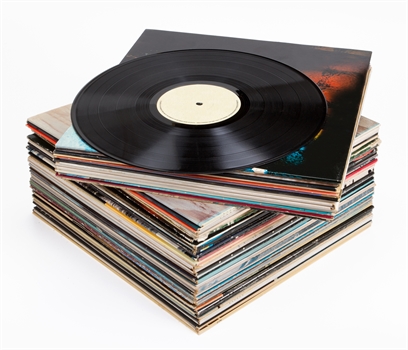For many music fans, a collection of vinyl records is a source of great satisfaction. But LPs and singles are a bit fussy about their storage, so here are some dos and don’ts that will help you keep your record collection playable for years to come.
Does my vinyl collection need climate-controlled storage?
According to experts, vinyl records are best stored between 7°C and 10°C. At temperatures higher than 10°C records will, over time, start to warp.
This temperature range is hard to achieve in a domestic setting, particularly a garage, attic or outbuilding. But it is achievable if you keep your record collection in a climate-controlled storage unit.
Use inner sleeves to protect your LPs
Records go down in value quickly if they are scratched or marked, so serious collectors take extra care to protect their stored vinyl with inner sleeves.
Outer sleeves give vinyl records best protection from dust
The covers of vinyl records also need protection, and collectors often use an outer sleeve as well as an inner sleeve. Some collectors prefer to keep the record and cover inside a bag for maximum protection from dust.
Sturdy shelving and boxes for vinyl
If you’ve ever tried to lift a stack of records, you’ll know that vinyl in quantity is surprisingly weighty. Sturdy shelving is a must, as a collapse could ruin your collection. Even a slight bow in a shelf can warp stored records over time. So invest in good quality shelves and take care when filling them to make sure your collection is balanced. Here are Store and Insure’s own tips for installing shelving in a storage unit.
Some people prefer to keep their records in boxes for easy transport. Many collectors feel that cardboard is not up to the job, and plastic boxes are a better choice. Make sure you only store your boxed records in quantities that you can easily lift, and opt for plastic boxes with handles so you can get a good grip.
Keeping a record of your vinyl collection
Knowing what you have in your collection will help you when you are at a record fair or record shop, so that you don’t waste cash on duplicates. It will also help you to keep an eye on the value of your collection for insurance purposes. A database or spread sheet of your record collection can give insights into your vinyl, such as your buying habits over time, and it will make it easier for you to put your hand on the exact disc that you want to play.
Valuing your vinyl record collection for insurance
Passionate record collectors invest so much time and money in their vinyl. Of course you can’t replace records that have sentimental value, but insuring your collection is worth considering. When you add a record collection to your contents insurance, whether it’s your home contents insurance or your self-storage insurance, you’ll need to give a value. Discogs has some information about valuing a record collection for insurance. Note that if you put your record collection into storage, like any personal property, it should be covered by your self-storage insurance. Remember that you will need to tell your insurer that the value of your stored goods has changed.


